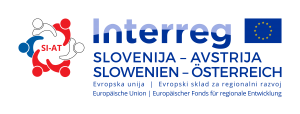

EU-Projekt YOUIND
• Förderprogramm / Programme: Interreg SI-AT
• Laufzeit / Duration: 01-04-2020 – 31-03-2022
• Projekttitel / Project name: „ Jugend in Industrie-Regionen – Stärkung institutioneller Kapazitäten im Bereich der Jugendabwanderung aus Industriestädten“ („Youth in industrial regions – strengthening of institutional capacities to cope with the outmigration of young people from industrial towns“)
Projektpartner / project partners:
• Karl-Franzens-Universität Graz (AT) / Institut für Geographie und Raumforschung
• Verein Steirische Eisenstraße (AT)
• Research Centre of the Slovenian Academy of Sciences and Arts / Geographic Institute Anton Melik (SLO)
• City of Idrija (SLO)
Download YOUIND Info-Flyer Deutsch/English: YOUIND Flyer DE YOUIND Flyer EN
Kurzbeschreibung
[ENGLISH summary: see below]
YOUIND befasst sich mit Jugendabwanderung aus peripher gelegenen Industriestädten im industrie-kulturellen Kontext.
Das SI-AT-Programmgebiet zeichnet sich durch eine relativ hohe Anzahl von Industriebetrieben aus, die häufig in kleinen und mittleren Städten angesiedelt sind. Diese Orte stehen vor Herausforderungen, da neue Trends (z. B. Industrie 4.0) zunehmend nach neuen, hochqualifizierten Arbeitskräften verlangen. Diese sind immer schwieriger zu finden, da jüngere Menschen ihre Region als nicht mehr attraktiv empfinden, sie verlassen und selten zurückkehren. Diese Trends bedrohen nicht nur Industrie, sondern auch die sozioökonomische Entwicklung ganzer Regionen im Programmgebiet.
Um dies weithin vernachlässigte Problem anzugehen, kombiniert die Partnerschaft akademisches und regionales Wissen. Beide Regionen – Idrija und die Steirische Eisenstraße – sind reich an industriellem Erbe und industrieller Gegenwart. Beide wurden ob ihres industrie-kulturellen Erbes von UNESCO anerkannt und sind Standorte weltweit agierender Unternehmen, wie Kolektor und Voestalpine. Das Projekt wird die spezifische industrielle Kultur der Orte als Potenzial zur Stärkung der institutionellen Kapazitäten nutzen, um junge Menschen wieder näher an ihre Region heranzuführen.
YOUIND sensibilisiert transnational für das Thema mittels:
– Wissensaustausch zw. Akteuren und Aufbau langfristiger reg. Netzwerke unter Einbeziehung von Jugend, Wirtschaft und Institutionen
– Entwicklung weithin sichtbarer Pilotaktivitäten zum Thema Jugend und industrieller Kultur
– Langfristiger reg. Aktionsplanung und grenzübergr. Strategieentwicklung
Ziel ist die Förderung sozialer Innovation und die Verbesserung institutioneller Kapazitäten durch Piloten und langfristige Aktionsplanung. Projektergebnisse werden in transnationale Handlungsempfehlungen umgewandelt, um so Wissen zu einem immer relevanter werdenden Thema, innerhalb des Programmraums bereitzustellen.
ENGLISH summary
YOUIND deals with the issue of youth outmigration from peripheral industrial towns and regions from an industrial-cultural perspective.
The SI-AT programme area is characterized by a relatively large number of industrial enterprises, which are often located in small and medium-sized towns. These places are facing new challenges, as new trends (e.g. Industry 4.0), increasingly demand for new, highly skilled workers. These employees are difficult to find, as especially younger people do not see these regions as attractive and leave, rarely to return. These developments do not only threaten industry, but also the socio-economic development of entire regions within the programme area.
To address this largely neglected issue, the YOUIND partnership combines academic and regional knowledge to raise institutional capacities. Both partner regions – Idrija and the Steirische Eisenstrasse – are rich in their industrial past and present, with both of
them being on the UNESCO’s heritage list and are today sites of global companies such as Kolektor and Voestalpine. The project seeks to use this specific industrial culture of place as a potential for strengthening the institutional capacity on youth outmigration in order to link young people closer to their region.
YOUIND will raise awareness on the topic via:
– Fostering crossborder knowledge exchange between stakeholders and developing long-term network structures in the regions, involving youth, business and institutional actors
– Developing jointly highly visible pilot activities on youth and industrial culture
– Long-term reg. action-plans and transnat. strategic advice
The aim is to promote social innovation and improve institutional capacities through pilot actions and long-term action planning. The partnership will also translate project findings to transnational policy recommendations, distributing knowledge on emerging topic within the programme area.
Arbeitspakete / work packages
WP1: Institutional capacity building on the topic of youth outmigration
Work package 1 will ensure and foster knowledge exchange on coping with youth outmigration in industrial towns and regions. The aim here is to raise awareness for the topic and increase regional capacities to act via an intensive knowledge exchange between the regions of Idrija and Steirische Eisenstrasse and relevant regional stakeholders.
WP2: Pilot actions in regard to youth outmigration and industrial culture
Work package 2 will ensure the joint preparation and implementation of 2 pilot actions (festival of industrial culture and school initiative), fostering social and institutional innovation via knowledge exchange within industrial regions on the topic of youth outmigration. The main aim is to show-case the (positive) relations between the regions and industry to a wider public, increasing outreach to other target groups and aiming for a change in perception of industrial regions and triggering a process of social innovation. Additionally, the pilot actions will serve to strengthen involvement of the regional stakeholder networks by conceptually supporting the pilots – thereby increasing regional capacities to act.
WP3: Long-term regional action planning and cross-border strategies
Based on the gained insights from the previous WPs, the partnership will derive the concluding project results – first, politically underwritten regional action plans. These two documents (1 by each region) will reflect on the project achievements and mapping out future activities in this field. This will be done in tight connection to the regional actor’s networks, thereby creating new capacities in the regions, also advocating for a continuation of the network beyond the project life-time. In a second part of the WP, the results will be used to raise awareness to the topic of youth outmigration in industrial towns via a transnational strategy paper, addressing specifically policy-makers from similar local and regional contexts within and outside the programme area Slovenia-Austria. These results will be translated into policy recommendations on the topic of youth outmigration in industrial towns and regions.
ÜBER JUNGE MENSCHEN IN INDUSTRIESTÄDTEN
In den letzten Jahrzehnten sind Industriestädte fast vollkommen von der politischen Tagesordnung Europas verschwunden. Wenn von ihnen die Rede ist, dann werden sie oft in einem negativen Licht dargestellt, als Orte, die „zurückgelassen“ wurden und durch wirtschaftlichen, sozialen und kulturellen Niedergang und Abwanderung gekennzeichnet sind. Diesbezüglich gelten insbesondere junge Menschen als eine der demographischen Schlüsselgruppen. Ganz im Gegensatz zu diesem Stereotyp zeigen jedoch neuere europäische Studien, dass kleinere Städte zum Teil nach wie vor über einen bedeutenden Industriesektor verfügen und einige Industriestädte sogar eine hohe Resilienz gegenüber externen Krisensituationen aufweisen. Außerdem könnten sich, angesichts von Anzeichen einer Reindustrialisierung Europas, bestehende Industrieregionen als wichtige Zentren für weiteres Wachstum entpuppen. Neben ihrer Funktion als wichtige Produktionsstandorte sind solche Räume auch Schauplätze von gelebtem industriellen Erbe, Kultur sowie Werten und bieten zudem wichtige soziale Infrastrukturen und Arbeitsplätze für ihr Umland. Die Jugend als relevante Gruppe für die Entwicklung kleinerer Industriestädte ist ein vernachlässigtes Thema in akademischer Forschung und Politik. Damit verbundene Aspekte der Demographie werden in diesem Kontext nur selten diskutiert. Wenn doch, dann oftmals in einem negativen Kontext, wo von „rostigen“ Regionen und keiner (aussichtsreichen) Zukunft für junge Menschen die Rede ist. Auch hier werden Industriestädte weitgehend mit Schrumpfung, Überalterung und Abwanderung von Fachkräften in Verbindung gebracht, während die Gründe und Prozesse hinter diesen Phänomenen in der Regel nicht ausreichend erforscht werden. Diese Wissenslücke ist besonders signifikant, da selbst erfolgreiche Industrieregionen, die oft ein breites Spektrum an Beschäftigungsmöglichkeiten für junge Menschen bieten, mit negativen demographischen Herausforderungen und Abwanderung konfrontiert sind. Solche demographischen Trends in wirtschaftlich erfolgreichen Regionen stehen im Gegensatz zu der weit verbreiteten Annahme, dass die Abwanderung in erster Linie durch wirtschaftliche Faktoren verursacht ist. Dabei sind durchaus auch andere Bereiche, wie beispielsweise Bildung, kulturelles Leben, kreativer Ausdruck und Partizipation wichtig für das Leben junger Menschen in Industriestädten. Ihre Bevölkerungsdynamik, ihre modernen Lebensstile und ihre komplexen Alltagsbedürfnisse sind damit eine besondere Herausforderung der Stadt- und Regionalplanung.
ABOUT YOUNG PEOPLE IN INDUSTRIAL TOWNS
Industrial towns have all but disappeared from the European political agenda in recent decades. When they are talked about, they are blatantly portrayed in a negative light, often as places that have been ‘left behind’. They are characterised by economic, social, and cultural decline, and outmigration, especially among young people as one of the key demographic groups. In contrast to this stereotype, some recent European studies show that smaller towns often retain a significant industrial sector and some industrial towns even show higher resilience to external crises. Moreover, given the signs of reindustrialisation in Europe, existing industrial areas may prove to be important centres for further growth. Not only do they function as important production sites, but they are also the scenes of vibrant industrial heritage, culture, and values and they provide important social infrastructure and jobs for their surrounding areas. Youth as a relevant group for the development of smaller industrial towns is barely a topic of academic research and policy making; related aspects of demography, migration, and mobility are rarely discussed in this context. When they are, the topic is usually placed in a context that fits the prevailing narratives of ‘rusty’ regions where there is no future for young people. Industrial towns are still widely associated with shrinkage, ageing, and brain-drain, while the reasons and processes behind these phenomena have usually not been sufficiently explored. This knowledge gap is particularly striking as even successful industrial regions, which often offer a wide range of employment opportunities for young people, face negative demographic challenges and outmigration. Such demographic trends in economically successful regions are contrary to the widespread assumption that outmigration is primarily caused by economic factors. In fact, other areas, such as education, cultural life, creative expression, participation, etc. are also important for the lives of young people in industrial towns. Their population dynamics, modern lifestyles, and complex everyday needs are a special challenge for urban and regional planners.
